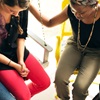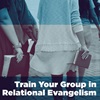What do you mean by the phrase "organic community"?
What I hope to communicate is that there is a way people naturally connect with each other—that you don't have to coerce it or force it, that people are naturally doing it already.
In your book you seem to say that churches often use a "master plan" mindset instead of creating community organically. What does that look like, and why is it a bad idea?
First of all, let me say that what I mean by "master plan" in the book is a specific kind of master plan that's common in churches. I don't ever want to communicate that all master plans are bad. I mean, when I fly on an airplane, I hope it has been put together using some kind of a master plan—I really hope that that's true.
But when dealing with people's lives, what I hope is that we're thinking more as artists than assembly line workers. Almost everyone I meet wants to live their life in an artistic way. They want to be the artist of their life, or at least collaborate with God to be the artist of their life.
Our churches know this, and we genuinely want to help. So what we often do is give our people a paint-by-numbers kit—a way to ensure that when someone takes certain steps in the right order with the right colors in the right framework and stays within the lines, he or she will come out with a painting that looks how a "Christian" is supposed to look. That paint-by-numbers kit is what I refer to as a master plan—a structure way of accomplishing something that is very linear and very simplistic.
But in reality, life just doesn't happen that way. What people want is an empty canvas; they want us to show them all the different ways that a horse can be painted, how it's been painted throughout history with different creativity and different strokes and different mediums, and then send them off and say, "Go paint your life."
Why do churches tend to drift toward master-plan thinking?
I think that it comes from several things. One is that we are definitely unschooled in the art of a modern mindset. This industrial mindset says that everything works by X + Y = Z. But what we've found in things like medicine is that, when you're talking about things that are alive, things just don't happen so simply.
Second, not only are we culturally romantic toward the Industrial Age, it's just easier. It's easier to put on paper. It's not easier to do, but it's easier to put on paper and show people that you're actually accomplishing something. It's easier to measure.
How does this master-plan mindset reveal itself in small-group ministries?
One way is phrases like, "100 percent of this congregation needs to be in small groups," or, "The best way to connect here at this church is through small groups." Any time we say best in our culture, those who hear us will interpret it as only. But in reality, we should give everyone the opportunity to decide individually whether they need a small group in their particular season of life. It may be that certain people naturally build intimacy in other settings and other ways, and we should respect that.
What about all of the different models of small-groups ministry that are currently available?
I would like for us to think about small-group models in the same way we think about model human beings. For instance, some people are beauty models, meaning we find them so beautiful that they stand before us and we want to paint a picture of them or wear this certain kind of clothing, because they're a model. But there are thousands of models in the world, and none of them look the same. We can admire and even benefit from the styles of several different models without becoming permanently attached to one.
So, in terms of small-groups ministry, I'd like for us to stop looking at small-group models as pre-molded situations where we're just stamping programs out of this mold. Most models are helpful, and they all have within them streams and patterns that can be very beneficial. But there's a danger in taking what worked with one church and trying to slam it down into another church, another culture, and assume things will work the same way.
I'm curious how specific aspects of small-group life would work in a ministry that has grown in an organic way. For example, is there such a thing as "organic accountability"?
Well, one thing that really disturbs me about today's accountability movement is that the actual term, accountability, is not really what we should be shooting for. It's also not really what we want to accomplish. God asks us to engage in loving relationships. First Corinthians 13:5 says, "Love keeps no record of wrongs." So we're not supposed to keep an account. There's no Scriptural idea of an accountability partner. It's unloving to get in a relationship where someone else is keeping records for you.
I like the term editability, because what we're really after is someone to think so much of us that they want our voice to come out—they want us to look better, to sound better, and to communicate better. And that's what an editor does. A good editor helps you correct what you voluntarily bring to them, and then they take that piece of paper and tear it up. It's never referred to again.
In Organic Community you mention that intimacy and community are things that can't be forced—just like you can't force yourself to fall asleep. But we can make changes to our small-group environment that make it more conducive to intimacy and community, just like we can make our bedroom more conducive to sleep by turning off the lights, buying a comfortable bed, etc.
That's right.
Do you have any tips that can help individual small-group leaders create an environment that is more conducive to intimacy and community?
First of all, you have to evaluate what kind of connection you want to have. For instance, some small-group directors will call me and say, "We've got four or five small groups in our church, and all they do is socialize." And I say, "Good. Let them just socialize. That's an important part of Christianity. It's an important part of their life."
Now, I would guess that if I attended those groups, the homes themselves would be set up in a social way. There would be a lot of food. There would be a lot of room for just standing and talking. There would be couches and chairs set up in little pockets. That's an environment that is conducive to natural connection.
But in most small groups, we switch that off and move everyone to a round circle so that eight or ten of us can see each others' faces. But when that happens, you've just changed the environment. Let's be real—none of us sit around in a circle with eight or ten people in the normal course of our lives (unless we're at a business meeting). It's just not a natural way to connect in our culture.
So when we gather everyone in a circle after they've been connecting, we're communicating that something is changing. We're doing something different. And after a few times, the group members begin to understand that we're moving into a learning mode—that someone is going to teach us something. That's not a bad thing. We just need to realize that we change the intimacy level when we change the environment.
That kind of makes me curious—if Joe Myers were to lead a small group, what would it look like during the actual meeting?
Well, let's say I had eight people come over to my house. First of all, we would have food. And I would watch how people naturally are breaking up into twos, threes, fours. There would probably be one group of four, a group of two, another group of three, and then one person who's kind of a roamer. I would take advantage of that.
I would probably avoid gathering everyone into a big circle. Instead, I would start doing the "discussion" lesson with the largest cluster—the group of four. I'd say, "Hey, as you guys are just talking here, why don't you start talking about these three questions?" or, "Why don't the four of you pray for this one particular person?" And then I'd go to the next group of two and say the same thing. Eventually, our group would have four or five different kinds of experiences going on, all focusing on the same idea or subject. I just think that would be better than me trying to get everyone to cooperate with the experience I want them to have.
Joe Myers is the author of Organic Community and a leading thinker on church and community life.
Joseph Myers; copyright © 2008 by the author and Christianity Today









